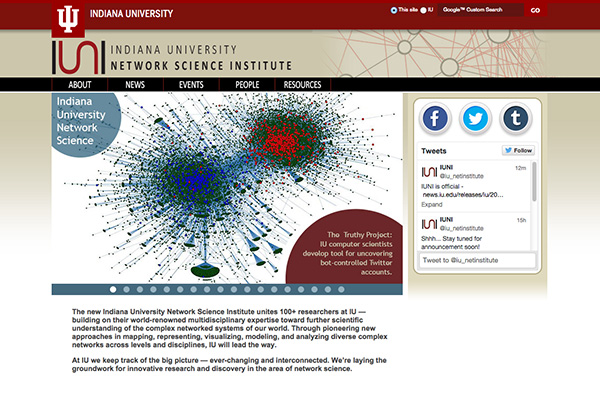Indiana University investing $7 million for new complexity institute
| IUPUI Newsroom

The following is an article from the IUPUI Newsroom. Read the original article here, or download a PDF of the article here.
BLOOMINGTON, Ind. -- Indiana University has announced the establishment of the Indiana University Network Science Institute, or IUNI. The $7 million initiative will bring together many of the university’s top minds to explore and embrace the challenge of understanding complex networks that underlie large-scale systems, including the environment, economics, technology and human health.
“Today, more than ever before, exploring the connections and relationships among our most complex networks -- from the biological to the economic, political and social -- is paramount to solving humankind’s most critical and challenging questions,” IU Vice President for Research Jorge José said. “Through the formation of this new interdisciplinary, university-wide institute, which will reflect all of the major sectors of scientific research and will be supported by the university's robust technological infrastructure, Indiana University has positioned itself to become the leading global center for understanding the complicated structure and evolving dynamics of the systems that drive our society.”
Complex networks are at the core of an ever more interconnected social, economic and technological planet, and their connectivity and dynamics underpin nearly all aspects of how these systems function. Networks can be associated with topics as diverse as cancer, schizophrenia, even the spreading of rumors, innovations or social unrest.
Echoing the late IU Nobel Laureate Elinor Ostrom, who said, “When the world we are trying to explain and improve … is not well-described by a simple model, we must continue to improve our frameworks and theories so as to be able to understand complexity and not simply reject it,” José said that focusing on the interactions between huge numbers of system components -- be it in the brain or the global economy -- places the university at the forefront of shaping new paths for research and innovation.
Three faculty members named as founding co-directors helped lead the effort to create the institute: Distinguished Professor Bernice Pescosolido, Department of Sociology; Distinguished Professor Olaf Sporns, Department of Psychological and Brain Sciences; and Andrew Saykin, professor of radiology and imaging sciences and director of the Indiana Alzheimer Disease Center at the IU School of Medicine.
The institute will be unique in a number of ways: Affiliated researchers will represent multiple IU campuses and will come from medicine, the natural sciences, the social sciences and the humanities; in addition to being focused on networks, every project supported by the institute is required to be a collaboration, a reflection of the institute itself. Four research hubs currently form the core of IUNI -- Health and Health Care, Network Neuroscience, Science of Science and Social Network Science -- each with the capacity to engage and share data and other resources with one another. Outreach activities, workshops and conferences and efforts toward online network science education will add to the scope of IUNI activities.
The three-year initiative -- with an opportunity to renew for another three years -- will be supported by IU President Michael A. McRobbie's office, the offices of Provost and Executive Vice President Lauren Robel and Vice President for Research José, the College of Arts and Sciences, the School of Informatics and Computing, and the School of Medicine.
“This new institute recognizes that we are all part of networks, and that these networks, ever evolving and changing, are inherently complex systems that present challenges to scientists across all fields,” Robel said. “With a contingent of over 100 scientists spanning all disciplines, the ties among network science researchers that already exist in the IU system are ripe for encouragement, with many new ones inevitable through support of IUNI.”
To date, affiliated faculty from 26 different schools, departments and centers have either participated in development of IUNI or expressed an interest in participating in collaborative research through the institute. Faculty participating in the institute represent one of the broadest and deepest cadres of researchers studying networks, including the College of Arts and Sciences departments of physics, psychological and brain sciences, statistics, sociology and geography; the School of Informatics and Computing at IU Bloomington; the School of Medicine; the School of Public Health-Bloomington; the Fairbanks School of Public Health at IUPUI; and centers already focused on different aspects of complex networks, such as the Indiana Center for Systems Biology and Personalized Medicine at IUPUI and the Digital Science Center at IU Bloomington.
The three co-directors applauded the announcement.
“IUNI will provide novel concepts, tools and training to address tomorrow’s challenges,” Saykin said. “We appreciate the university’s vision in supporting team science to elucidate the complex networks that comprise the human genome, brain interconnectivity, health care systems and society -- creating a truly exciting and unprecedented opportunity.”
Pescosolido described the nature of the institute as a reflection of the very work that will be conducted there, an exercise in synergy.
“We live in a world where society and the problems we face represent a web of interconnections,” Pescosolido said. “When we think we have fixed one part of it, unforeseen complications arise elsewhere as unintended consequences. These are complex, connected interactions that demand a transdisciplinary approach that brings the expertise across the landscape of science to the table.”
Sporns added that the new institute recognizes the natural strengths already present at IU.
“By design, when it comes to our expertise in complex systems, the whole is greater than the sum of the parts,” he said. “With the new synergies that will be created through IUNI, we have the unique opportunity to break the mold and approach the many challenges we face in science and society from a fresh and broad perspective.”





